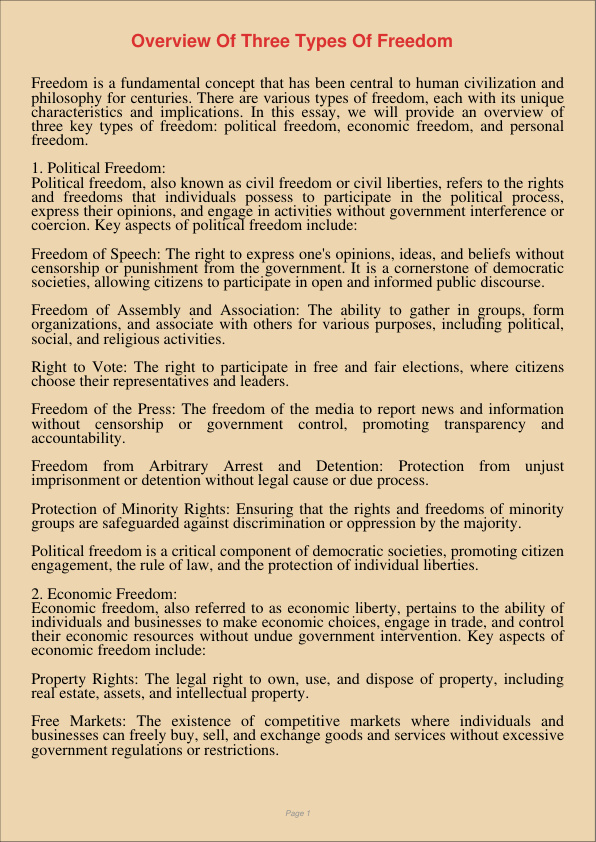Overview Of Three Types Of Freedom
Jan 12, 2024
three types
overview
Visual Arts & Film Studies
Religion and Theology

Freedom is a fundamental concept that has been central to human civilization and philosophy for centuries. There are various types of freedom, each with its unique characteristics and implications. In this essay, we will provide an overview of three key types of freedom: political freedom, economic freedom, and personal freedom.
- Political Freedom: Political freedom, also known as civil freedom or civil liberties, refers to the rights and freedoms that individuals possess to participate in the political process, express their opinions, and engage in activities without government interference or coercion. Key aspects of political freedom include:
Freedom of Speech: The right to express one’s opinions, ideas, and beliefs without censorship or punishment from the government. It is a cornerstone of democratic societies, allowing citizens to participate in open and informed public discourse.
Freedom of Assembly and Association: The ability to gather in groups, form organizations, and associate with others for various purposes, including political, social, and religious activities.
Right to Vote: The right to participate in free and fair elections, where citizens choose their representatives and leaders.
Freedom of the Press: The freedom of the media to report news and information without censorship or government control, promoting transparency and accountability.
Freedom from Arbitrary Arrest and Detention: Protection from unjust imprisonment or detention without legal cause or due process.
Protection of Minority Rights: Ensuring that the rights and freedoms of minority groups are safeguarded against discrimination or oppression by the majority.
Political freedom is a critical component of democratic societies, promoting citizen engagement, the rule of law, and the protection of individual liberties.
- Economic Freedom: Economic freedom, also referred to as economic liberty, pertains to the ability of individuals and businesses to make economic choices, engage in trade, and control their economic resources without undue government intervention. Key aspects of economic freedom include:
Property Rights: The legal right to own, use, and dispose of property, including real estate, assets, and intellectual property.
Free Markets: The existence of competitive markets where individuals and businesses can freely buy, sell, and exchange goods and services without excessive government regulations or restrictions.
Rule of Law: The enforcement of contracts and protection of property rights through a transparent and impartial legal system.
Limited Government Intervention: Minimizing government involvement in economic activities, such as price controls, excessive taxation, and burdensome regulations.
Entrepreneurship: Encouraging innovation and entrepreneurship by allowing individuals to create and develop businesses.
Economic freedom fosters economic growth, innovation, and prosperity, as it allows individuals and businesses to make decisions based on their own interests and market conditions.
- Personal Freedom: Personal freedom, also known as individual freedom, encompasses the autonomy and rights individuals have over their own lives and personal choices. Key aspects of personal freedom include:
Freedom of Conscience: The right to hold personal beliefs, values, and religious convictions without coercion or discrimination.
Privacy: The protection of personal information, data, and private matters from unwarranted intrusion, surveillance, or unauthorized access.
Freedom of Lifestyle: The ability to choose one’s way of life, including matters such as family, relationships, sexuality, and personal beliefs.
Reproductive Rights: The right to make decisions regarding reproduction, including family planning, contraception, and abortion.
Freedom of Movement: The ability to travel, live, and work in different locations, both within one’s country and internationally.
Right to Education: The right to access education and knowledge without discrimination or barriers.
Personal freedom underscores the importance of individual autonomy and the right to make choices about one’s own life, identity, and beliefs without interference from external entities, including the government.
In summary, political freedom, economic freedom, and personal freedom are essential dimensions of liberty and human rights. They collectively contribute to the well-being and development of individuals and societies, allowing people to participate in the political process, pursue economic opportunities, and make personal choices, ultimately leading to more open, just, and prosperous societies.